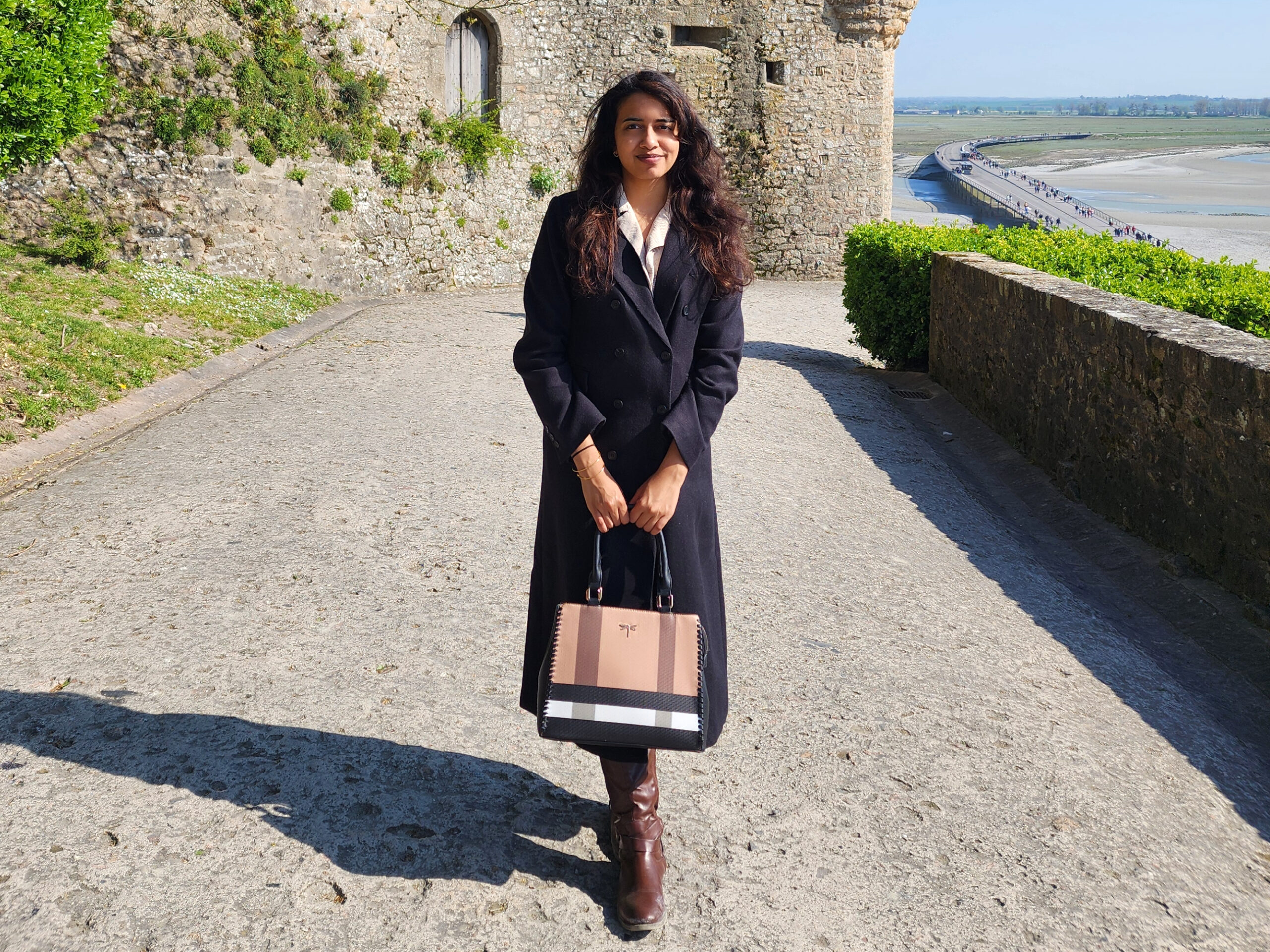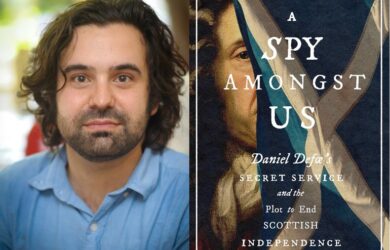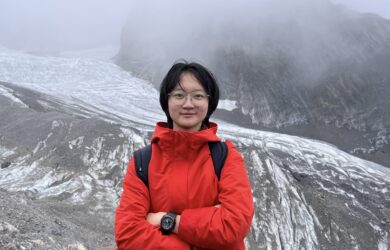
Janani Mohan's research explores nuclear energy from a novel security and deterrence perspective.
I’m interested in how governments are improving their intrinsic ability to prevent attacks by developing advanced reactors with safety by design and how emerging technology can help prevent nuclear disaster.
Janani Mohan
Janani Mohan [2023] is at the centre of one of the biggest topics of our times – nuclear security. Janani is an expert in nuclear policy, having worked in the field for several years. Her PhD in Nuclear Energy and Security Policy comes at a time of uncertainty in global energy supplies, increasing interest in nuclear power and growing alarm at the prospect of nuclear proliferation. In the past few months, the US bombed Iran’s nuclear facilities, while Russian activity at Ukraine’s nuclear power plants has raised concerns over their safety.
In this contested environment, Janani’s interest, however, is turning towards exploring nuclear energy from a novel security and deterrence perspective. This ability to take a step back and look at the world in a different way is in part linked to her upbringing. Janani’s unorthodox and international education opened her mind to different ways of doing things and emphasised the importance of prioritising making a positive impact.
She has certainly already done that. During Covid, Janani addressed the tumultuous economic environment via a thriving mentorship non-profit that helped thousands to find jobs or rethink their careers, all around the world. She brings all of this creativity and passion for doing good to her PhD as a Gates Cambridge scholar.
Childhood
Janani was born in San Jose, California, but moved to Washington, DC at the age of 15. For much of her childhood, she and her older sister were taught in a hybrid way – as part of an independent study programme at school, but by her mother at home. Both her parents are immigrants to the US from India: her father is an international businessman and her mother was a nutritionist, before she dedicated herself to teaching her children. “She wanted us to love learning and not hate education,” says Janani, who adds that her school activities included outdoor hiking to study plants and field trips to NASA to explore astronomy and space.
Janani was also exposed to the Classics and Shakespeare from an early age because of her sister, who was academically advanced. Janani and her sister kept busy with extracurricular activities, including tennis, karate, ice skating and horse riding to ensure they didn’t just sit around the house reading. “My mom had to try and keep me away from books because I was such an avid reader,” admits Janani.
Beyond this eclectic childhood, the world itself also became Janani’s classroom. As a child, she spent several months in India and travelled frequently with her parents on her father’s business trips. Just before she started high school, Janani spent half a year at a school in Switzerland after her sister became the first high school student to be offered an internship at CERN. There, Janani was taught in French, a language she didn’t know previously, and was exposed to a different lifestyle. Her travels taught her how diverse the world is and gave her an insight into different people’s struggles.
In her last two years at high school, Janani did several internships, often competing with university students to get them. First, she interned twice at the Smithsonian, working on the use of volcanic satellite data and cartography. She also interned at the Humane Society of the US [now Humane World for Animals] in the media relations department. In addition, she took classes at her local community college, which meant she could transfer credits and would later graduate early from her undergraduate degree.
Undergraduate studies
When Janani finished high school, she had a lot of options open to her, but she knew that she wanted to do something with social impact. Janani’s interests lent towards political science and media relations, so she began a degree at UC Berkeley where, after the first year, she chose to major in Political Science.
While at Berkeley, she contributed to the Department of Energy’s national laboratories, the State Department and other organisations on nuclear policy. Janani also served as an NGO representative to the 2017 Nuclear Non-Proliferation Treaty preparatory committee at the United Nations in Vienna, meeting with delegates from around the world. The experience opened her eyes to the complexity of policy-making and how many different actors often have to work together to even take a single step forward. It also sparked her lifelong quest to understand nuclear stability, a question that still fuels her PhD research today.
Janani finished her undergraduate studies in 2019 and spent the latter half of the year working on Capitol Hill. At that time, there was an impeachment inquiry over allegations that the US president had improperly sought foreign interference to boost his chances of re-election. The charged atmosphere provided Janani with new perspective on politics and left her questioning what she wanted to do next.
Enterprise
Janani decided to take a gap year to figure out her next steps and travel around the world. The timing, however, could not have been more off: it was 2020 and the US went into its first Covid lockdown soon after.
As the impact of the pandemic increased, Janani and her family felt like they had to do something to help others. Through posting job advice on LinkedIn, Janani and her sister received hundreds of messages within the very first week from people asking for help. “We realised very quickly that people were losing their jobs, graduates were finding it difficult to get new jobs and students were finding their universities closed. People were suffering financially and mentally as a result,” says Janani.
She, her sister and brother-in-law soon set up a non-profit, where they matched thousands of people from around the world with mentors to assist them with everything from career support and university applications to mental health coaching. The non-profit took off and there were numerous regional teams, with large presences in North America, Africa and Asia. Janani says that the mentors felt a sense of being able to help others through a difficult time and that she was inspired by their commitment to volunteer to do good.
Janani also recalls her fears during that time as her own household was particularly affected by the pandemic because her family members were immuno-compromised. The non-profit ran for a couple of years until the pandemic restrictions finally started lifting.
Master’s and beyond
In the meantime, Janani also started a Master’s course in International Policy at Stanford University in 2020, where she completed the first year online. In autumn 2021, Janani participated in an exchange programme in Vienna at the Diplomatic Academy. Amid continuing Covid restrictions, Janani had time to reflect about the kind of threats facing a changed world as it emerged from the pandemic.
Janani was back at Stanford when Russia invaded Ukraine in 2022 and concerns about energy supplies throughout Europe became front of mind. She volunteered with the United Nations to monitor attacks on Ukrainian nuclear energy facilities. In addition, Janani was writing up her main Master’s research thesis for the United Nation Development Programme on inequalities in the distribution of connectivity and technology access to different areas in South Africa. Clean energy seemed to be one important way to close the gap and fuelled Janani’s growing interest in nuclear options.
On graduation in May 2022, Janani worked as a research analyst for the Potomac Institute for Policy Studies on national science, technology and security policy. She also edited articles on nuclear and security policy for the Stimson Center’s South Asian Voices publications and consulted with the Europe-based Centre for Humanitarian Dialogue on de-escalation.
Through these experiences, Janani realised that she wanted to move to Europe to study and perhaps work. She applied to Cambridge, but it was only when she received the Gates Cambridge Scholarship in January 2023 that she knew she would be UK-bound. “I was in complete surprise,” she says. “I didn’t expect to get Gates. At that point, I had never been to the UK, but I really liked it as soon as I arrived. There seemed to be so much appreciation for and understanding of different cultures here.”
At Cambridge
Janani, who is the alumni officer on the Gates Cambridge Scholars Council, began her PhD in 2023 with a focus on researching the security of nuclear energy facilities during conflict, particularly in Europe and the Indo-Pacific. Under the supervision of Dr Steven Ward at the Department of Politics and International Studies, Janani is attempting to understand nuclear safety and security from a new perspective – via state efforts at deterrence and resilience-building.
At a time of shifting international relations and an increased global awareness of security issues, Janani says: “I’m interested in how governments are improving their intrinsic ability to prevent attacks by developing advanced reactors with safety by design and how emerging technology can help prevent nuclear disaster.”
Acknowledging all the support she has received so far, she says: “I am fortunate to be where I am – and now it’s up to me to do something good with what I’ve been given.”












